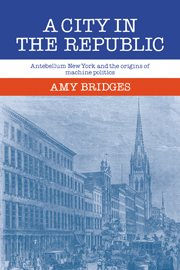Book contents
6 - THE VOICE OF INDUSTRY
Published online by Cambridge University Press: 07 October 2011
Summary
The working classes changed dramatically over the antebellum years. Growth and industrialization created new social places in which the working classes got, spent, and labored, and determined their increasing distinctiveness from other social groups as the wage laborer replaced the artisan. The changing character of the working classes also involved changes in their patterns of collective behavior, their political values, and their political demands. Since the new working classes were largely urban, it was in the city that their political capacity was greatest and that they had a significant impact on political life.
The transformation and the persistence in the political aims and values of the working classes helped to produce the broader ideological changes of the antebellum city, the increasing distinctiveness of city politics, and the persona of the boss. The working classes were empowered by the franchise, disciplined by their need to make political alliances, and constrained by available political choices. Like other social forces, their political will was mediated by the rules and order of politics. This chapter traces the relationships between the changing working classes and the city's political order.
THE AGE OF JACKSON
The mechanics of the Jacksonian era were the proud bearers of the ideology of Paine and the Revolution. They voiced, through the Workingmen's Parties and the General Trades' Union, a distinctive republicanism.
- Type
- Chapter
- Information
- A City in the RepublicAntebellum New York and the Origins of Machine Politics, pp. 103 - 124Publisher: Cambridge University PressPrint publication year: 1984



